The Year In Review: Celebrating Our Achievements in 2013 Part 2
Part 2 of our “year in review” focuses on the hospitals, research institutes and centers that are part of the UF Health family. When added to the colleges described last week, the size and scope of UF Health is nothing short of astonishing. We can all be very proud of the level of achievement at our academic health center, and look forward to a bright future with much anticipation.
UF Health Cancer Center
Director: Paul G. Okunieff, M.D.
The UF Health Cancer Center is enjoying another year of growth and expansion. Advances include improvements in clinical care, basic and clinical research, and education. We are proud to have earned American College of Radiology certification for our radiation oncology program, and recertification by the National Accreditation Program for Breast Centers. Both programs require rigorous multidisciplinary and comprehensive treatment collaboration, clinical and basic research, screening and population health programs, and survivorship support programs. Our grant portfolio and basic research is now at nearly $9 million of direct funding annually from the National Cancer Institute, with a total of more than $30 million from all sources. Among the awards was a prestigious statistics and data center grant with the Children's Oncology Group, led by Meenakshi Devidas, Ph.D., a research associate professor and associate program director in the department of biostatistics. Our clinical trials program is growing with more than 100 active protocols; our faculty members serve as national chairmen for several important clinical cooperative groups; and Carmen Allegra, M.D., a professor of medicine and chief of hematology oncology, became editor-in-chief of the prestigious Journal of the National Cancer Institute.
A major mission of the UFHCC is to improve health throughout the state. We have added or strengthened relationships with many facilities throughout the state, including in Orlando, Tallahassee, Jacksonville, and Winter Haven, among others. We are particularly pleased with our improving relationship with the VA hospital and the increasing opportunities we have to benefit those who have served our country.
Collaborations on campus are growing and include co-recruitments of scientific teams. The Center for Inflammation and Mucosal Immunology includes representatives from multiple colleges and welcomed three recent recruitments, Mansour Mohamadzadeh, Ph.D., a professor of pathobiology in the UF College of Veterinary Medicine, and Ellen Zimmerman, M.D., and Christian Jobin, Ph.D., of the College of Medicine. This powerhouse of science includes Robert Hromas, M.D., a professor and chair of medicine. In collaboration with the department of neurosurgery we have recently recruited Duane Mitchell, M.D., Ph.D., from Duke University, to serve as co-director of the Preston A. Wells Jr. Center for Brain Tumor Therapy and director of the UF Brain Tumor Immunotherapy Program. Dr. Mitchell has already implemented exciting immunotherapy treatment options for our patients with malignant gliomas.
Next year holds both promise and challenge, with plans to further increase our research portfolio, recruit basic research and epidemiology teams, compete to earn the state’s cancer center of excellence designation, and acquire the newest and best drugs and technologies to benefit our patients. Looking back, we have overcome many obstacles and are growing with momentum in all our academic and clinical missions.
Clinical and Translational Science Institute
Director: Dave Nelson, M.D.
The CTSI turned 5 in 2013 and embarked on several efforts to assess its impact and facilitate health research through transformation, services and education.
The year was also marked by expanded leadership for the CTSI. In recognition and advancement of the CTSI’s campuswide mission, CTSI Director David R. Nelson, M.D., was named assistant vice president for collaborative research in the life sciences by the UF Office of Research.
In the fall, the CTSI welcomed Thomas A. Pearson, M.D., M.P.H., Ph.D., executive vice president for research and education for UF Health, as a new adviser, stakeholder and partner in strengthening collaboration across UF Health entities.
CTSI accomplishments reflect the vision and dedication of hundreds of faculty, staff and students from across the university and at partners throughout the state.
Impact at five years As it approached its fifth year, the CTSI commissioned two analyses to assess its impact on collaboration at UF, researcher productivity and success, and economic activity in the state.
Social Network Analysis experts in the College of Liberal Arts and Sciences examined the CTSI’s effect on UF’s scientific collaboration network from 2008-2012. The project found the CTSI network of investigators increased in size and as a proportion of the total UF network; the CTSI network increased cohesion and diversity of the UF network, and the CTSI pilot award program created new collaborations and brought new researchers into the network.
An analysis by the UF Bureau of Economic and Business Research showed substantial increases in investigator productivity following affiliation with the CTSI, measured by increases in external funding (310%), publications in top 100 journals (41%) and patent filings (38%) from 2009-2012. The analysis also found that every $1 of CTSI operating expenditures helped spur an additional $11 in external funding, increasing the CTSI’s impact on regional employment and economic activity accordingly. In total, from 2008-2012, spending on CTSI operations supported an estimated 8,351 person years of employment and $1.1 billion in economic activity in Florida.
Transformation CTSI efforts to transform the research environment made significant strides in 2013.
Personalized Medicine: In June, the CTSI-led UF Health Personalized Medicine Program received a $3.7 million grant from the National Human Genome Research Institute to bring personalized medicine to more Floridians. The four-year project is one of just three demonstration projects funded nationwide to show how patients’ individual genetic profiles may be used to better tailor clinical treatments. Additional recognition came for the program’s informatics team when InformationWeek profiled UF Health IT as a top business innovator in 2013 for its work to turn genetics into actionable information.
Clinical and Translational Research Building: The CTRB opened in the summer of 2013 and already is a vibrant headquarters for clinical and translational research, bringing the CTSI, Institute on Aging, academic departments, research teams and research participants under one roof. The new building allowed the CTSI’s Clinical Research Center to greatly expand its facility. The Clinical Research Center offers exam and procedure room space, specialized research equipment, as well as nursing, bionutrition and laboratory services. To increase access to the new facility, the CTSI announced in the fall a Clinical Research Pilot Award RFA that is accepting applications through March 31, 2014, for pilot studies in any disease or age group.
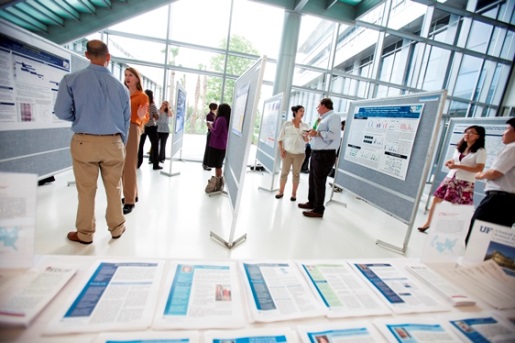 Metabolomics: In September, the CTSI’s Southeast Center for Integrated Metabolomics launched with a five-year, $9 million grant from the National Institutes of Health. SECIM is one of six regional centers supported by the NIH Common Fund to spur metabolomics research in the United States. SECIM unites expertise and resources from multiple colleges and units at UF as well as external partners, including the Sanford-Burnham Medical Research Institute.
Metabolomics: In September, the CTSI’s Southeast Center for Integrated Metabolomics launched with a five-year, $9 million grant from the National Institutes of Health. SECIM is one of six regional centers supported by the NIH Common Fund to spur metabolomics research in the United States. SECIM unites expertise and resources from multiple colleges and units at UF as well as external partners, including the Sanford-Burnham Medical Research Institute.
Implementation Science: The CTSI launched its Implementation Science Program to advance the adoption and integration of evidence-based health interventions to change practice patterns and improve health. The program builds on the model of the UF Health Personalized Medicine Program, in which implementation strategies are developed and piloted at UF Health and then adapted and tested for use in other health care settings. The program collaborates with UF Health leadership and the CTSI’s statewide research partners, including Health IMPACTS for Florida.
Research Services & Resources Established CTSI services and resources continued to grow in both scope and use, including several resources that are available at no charge to assist research teams with cohort identification and the recruitment of research participants:
- StudyConnect feeds hundreds of health research study listings to UFHealth.org;
- HealthStreet, a community-based initiative to reduce health disparities, has established contacts with more than 4,000 residents in the Gainesville area, enrolled more than 1,400 people in research studies at UF, and recently expanded to the Jacksonville community;
- The UF Health Integrated Data Repository and its i2b2 cohort discovery tool allow researchers to query an IRB-approved and HIPAA-compliant Limited Data Set, which is refreshed monthly and contains 121.3 million observational facts pertaining to more than 425,000 patients as of December 2013.
CTSI programs also launched recurring Design Studios and Implementation Science Innovation Studios to provide researchers with actionable feedback and advice on study designs and research ideas at any stage of development.
Education The CTSI Training and Professional Development Program continued to expand its offerings with the launch of the CTSI Mentor Academy and the CTSI Academy of Research Excellence’s research coordinator program. Branching beyond the university, the UF Health Personalized Medicine Program partnered with the UF Center for Precollegiate Education and Training to host the 13th annual Mini Medical School at UF, a one-day in-service opportunity for middle and high school teachers. The topic of personalized medicine drew record attendance, requiring two full-day sessions to accommodate the more than 200 teachers who registered from across the state.
Emerging Pathogens Institute
Director: J. Glenn Morris, M.D.
During 2013, the Emerging Pathogens Institute has continued to build a strong research portfolio in emerging pathogens/infectious diseases, further enhancing UF’s reputation as a top national and international center for infectious diseases research. Areas of potential interest include:
- EPI investigators continue to play a leadership role in the school-based influenza immunization program that provides free influenza vaccine to all children in Alachua County. In 2013 the Alachua County Commission established a $1.5 million trust fund to continue the program for at least the next 15 years, reflecting the success (and popularity) of the program. In keeping with mathematical models of influenza transmission, studies conducted by EPI have demonstrated the strong “community immunity” impact of the program, with substantial declines in influenza incidence across multiple age groups.
- EPI hosted the deputy minister of health of Saudi Arabia to discuss issues surrounding Middle Eastern respiratory syndrome (MERS-CoV), a newly recognized SARS-like illness in Saudi Arabia. EPI has received initial funding from the Saudi Ministry of Health for seven projects on MERS-CoV, and the epidemiology of transmission of this and other infectious diseases during mass gatherings.
- EPI investigator Greg Gray (PHHP) won new NIH five-year D43 grant funding to employ One Health approaches to difficult zoonotic disease problems in Mongolia. He is also partnering with more than 20 international institutions in developing a new One Health Center of Excellence in Research and Training at EPI.
- NIEHS-supported EPI investigators continue to address community concerns about seafood safety along the northern Gulf of Mexico by actively investigating inshore seafood harvests, analytical testing and seafood consumption surveys. Investigators will share in over $4 million in new funding awarded by the National Fish and Wildlife Foundation for these and related projects.
- EPI, in collaboration with PHHP and other colleges, continues to build a strong research base in the Gressier region of Haiti. Current studies include work on cholera transmission and evolution (funded by NIH), chloroquine resistance in malaria (funded by DOD), sexually transmitted infections (DOD), and multidrug-resistant tuberculosis (CDC); these studies are linked with work on sanitation, water systems and nutrition. Work is nearing completion on a new BSL3 laboratory adjacent to our current BSL2 facilities at the Gressier site.
- Recent papers of interest include work on spatial patterns of anthrax in deer in Texas (Jason Blackburn, CLAS, and colleagues); studies of cough aerosols in diagnosis of TB (Kevin Fennelly, COM); effect of spinach cultivar and bacterial adherence factors on survival of E. coli O157:H7 on spinach (Jorge Giron, COM); mapping spread and risk of avian influenza A (H7N9) in China (Greg Gray, PHHP); clinical and immunological aspects of post-kala-azar dermal leishmaniasis in Bangladesh (Eben Kenah, PHHP/COM); and partial characterization of a new adenovirus lineage discovered in testudinoid turtles (Jim Wellehen, Vet Medicine).
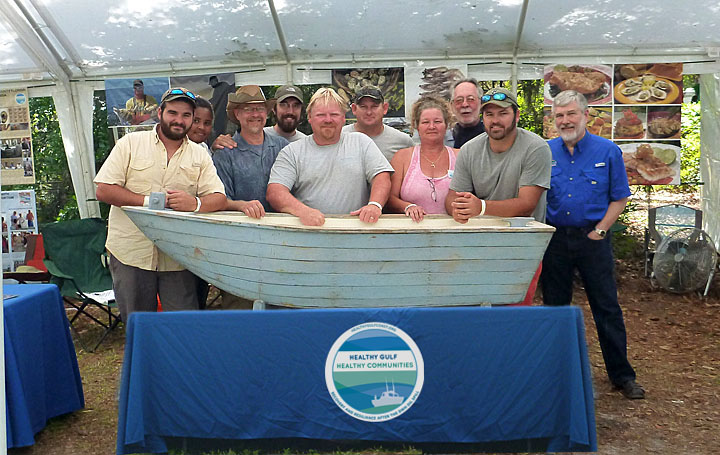
UF Genetics Institute
Director: Patrick Concannon, Ph.D.
The University of Florida Genetics Institute seeks to promote excellence in the areas of genetics and genomics at the University of Florida by (1) building community, facilitating collaboration and creating opportunities for intellectual exchanges among investigators working in diverse taxonomic systems but with a common set of approaches in genetics and genomics, (2) supporting recruitment and retention of outstanding faculty in the areas of genetic and genomics, (3) supporting graduate education in the areas of genetics and genomics, and (4) enhancing the ability of UF researchers to compete for multidisciplinary research grants in the area of genetics and genomics.
2013 was a year of transition for the UF Genetics Institute with a new director taking over in February. The strength of the UF Genetics Institute continued to be its more than 230 faculty, who, in 2013, were responsible for 22% of sponsored research awards to UF and more than 900 peer-reviewed publications.
Research: Research highlights in 2013 included a number of publications in high-profile scientific journals, including multiple papers in Science, Nature, The Lancet and Nature Genetics by UF Genetics Institute faculty. Noteworthy reports in 2013 included a study of the evolution of avian external genitalia from Dr. Martin Cohn’s laboratory that was published in Current Biology and was the topic of an article in The New York Times. In December, a collaborative study of the genome of the nearest living relative of flowering plants, led by Doug and Pam Soltis and Brad Barbazuk, resulted in multiple publications, including two papers in the same issue of the journal Science.
Education: In 2013, six students earned their Ph.D. degrees through the Genetics and Genomics Graduate Program, the most in any single year, to date, for the program. This intercollegiate program, directed by the UF Genetics Institute, continues to grow, with six more students admitted in the current year.
Service/Outreach: The UF Genetics Institute expanded its weekly seminar series in 2013, more than doubling the number of invited external speakers to 18. The invited speakers reflect the broad, multidisciplinary mandate of the UF Genetics Institute, and included outstanding investigators from the fields of bioinformatics, genomics and cell biology working on a variety of different species and model systems.
The Florida Genetics Symposium, hosted annually by the UF Genetics Institute, featured a keynote address from Dr. William E. Evans, director and CEO of St. Jude Children’s Research Hospital. More than 300 attendees heard presentations from Dr. Evans and a host of distinguished speakers, both from UF and other institutions. More than 100 posters were presented and, for the first time, awards were given for the best poster presentations by students and postdoctoral fellows. As always, Florida Genetics 2013 was enhanced by a specially created art exhibit by students from the College of Fine Arts with support from the UF Genetics Institute.
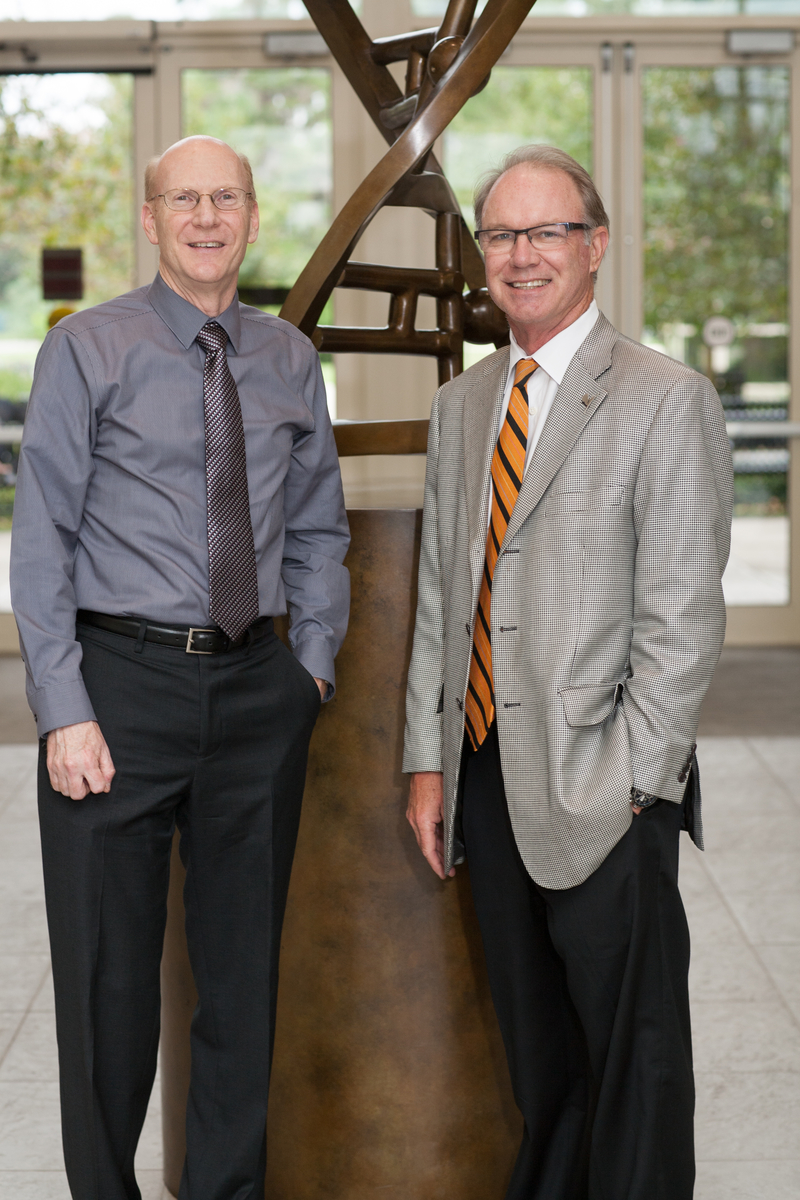
Institute on Aging
Director: Marco Pahor, M.D.
2013 was a year of significant change and a momentous growth for the UF Institute on Aging (IOA). We completed the move into our new home at the Clinical and Translational Research Building; our clinical practice for older adults, UF Health Senior Care, joined us in the comprehensive new facility. We welcomed new research partners and new leaders, including a new chief of geriatric medicine.
The UF Institute on Aging moved into a new building — a modern, environmentally friendly space that brings together researchers and clinicians from various fields. The Clinical and Translational Research Building houses basic science and clinical research as well as clinical practices, which provide primary care for adults age 65 and older. The IOA’s new home is a one-stop facility that makes it easier for mobility-restricted older adults to take part in clinical trials and strengthens connections among existing UF research centers, including the Clinical and Translational Science Institute, which also is headquartered in the new building. The $45 million, 120,000-square-foot complex (funded in part by the $14,985,700 NIH C06 construction grant for the IOA wing) was designed to meet the highest sustainability standards (LEED platinum) and make indoor spaces conducive to collaborative work, good health and well-being.
Dr. Marco Pahor and other faculty and staff traveled to the nation’s capital in May at the invitation of Sen. Bill Nelson, chairman of the U.S. Senate Special Committee on Aging, to take part in a Healthy Aging Expo hosted by the committee. The event marked the 50th anniversary of Older Americans Month and helped to educate members of Congress about innovations in technology and health care that can help improve the health and well-being of older Americans. In August, Sen. Nelson attended the ribbon-cutting ceremony for the IOA’s new home — the Clinical and Translational Research Building.
We made great strides with cutting-edge technology — human electrophysiological recording, stem cell research, noninvasive brain stimulation techniques — in our ongoing effort to slow or avert age-related cognitive and physical decline. We expanded our research, creating a Data Science Core and continuing to build our Cognitive Aging and Memory Clinical Translational Research Program. The Data Science Core (Manini, Ranka) is a new addition to the UF Pepper Center’s suite of research services. This core focuses on “big data” collected in hospital systems and through body-worn sensors that measure movements. This data is analyzed to monitor and enhance the health of older adults — for example, to discover reasons why older adults have trouble recovering their function after being hospitalized, or to understand how movement patterns are connected to our future physical and cognitive health.
Many of our junior faculty, through the mentorship of our Research Career Development Core, obtained extramural funding so that they may move forward with their own aging research:
- Dr. Shinichi Someya, NIH/NIDCD RO1 DC012552, Mitochondrial Thioredoxin, Caloric Restriction and Age-related Hearing Loss
- Dr. Todd Manini, NIH/NIA R01AG042525, Metabolic Cost of Daily Activities in Older Adults
- Dr. Stephen Anton, NCCAM/NIA R01 AT007564, REVIVE - Resveratrol to Enhance Vitality and Vigor in Elders
- Dr. Kimberly Sibille (K-Award), NIH/NIAMS K23 AR062099, Biological Markers of System Burden in Symptomatic Knee OA: A Prospective Study
- Dr. Thomas Buford American Heart Association, Young Investigator Award NCT01891513, Multimodal Intervention to Reduce Cardiovascular Risk Among Hypertensive Older Adults
- Dr. David Clark, Department of Veterans Affairs, Veterans Health Administration, Merit Review Award Rehabilitation of Corticospinal Control of Walking Following Stroke.
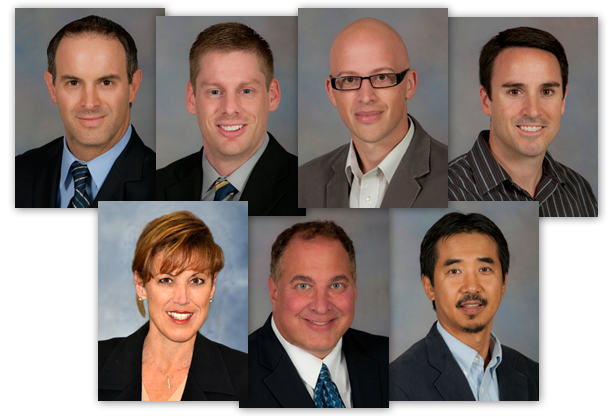
The Lifestyle Interventions and Independence for Elders (LIFE) study funded in 2009 ($64,400,000 + $9,300,000 supplement) conducted across eight sites around the country, is to find definitive evidence regarding whether physical activity is effective and practical for preventing major mobility disability. In this multicenter, randomized controlled trial, we sought to compare a moderate-intensity physical activity program to a successful aging health education program in 1,635 sedentary older adults. We completed the study in November and will be revealing the results of the study at the annual meeting of the American College of Sports Medicine in Orlando on May 27. To date, five papers have been published and eight ancillary research studies have been completed or are in progress. Among several other projects, we explored the role of mitochondrial function on exercise and fatigue, the quantifying of the physical activity intervention using accelerometry, complex mobility and executive function, and the effect of the LIFE interventions on global gene expression
Cognitive Aging and Memory Clinical Translational Research Program: Adam Woods, Ph.D., an assistant professor, joined the UF Institute on Aging’s Cognitive Aging and Memory Clinical Translational Research Program (CAM-CTRP) in July and implemented the Human Electrophysiology and Neuromodulation Core, a multidisciplinary lab that explores the link between brain function and various processes in the body. The CAM-CTRP is organized around several cores designed to focus on the aging brain. The lab has several upcoming projects that aim to address cognitive aging in healthy older adults using human electrophysiological recording, noninvasive brain stimulation and functional magnetic resonance imaging. The CAM-CTRP hosted the first annual External Review Board meeting in June with outcomes including initiating clinical trial development of novel agents to enhance cognitive and behavioral function in the elderly. A national search is currently underway for an M.D./Ph.D. researcher with a strong NIH track record. Dr. Ron Cohen is currently co-mentoring four graduate students and two postdoctoral fellows. The CAM-CTRP faculty has been extremely productive in the past year, publishing numerous manuscripts on topics related to cognitive and brain aging. Dr. Cohen’s NIH/NIDDK RO1 on obesity and type 2 diabetes — bariatric surgery effects on brain function and aging — received a perfect score at the first percentile. This five-year study ($492,000 per year) will be initiated in Spring 2014. The CAM-CTRP has 12 pilot studies that have been initiated or will be initiated over the next 12 months.
UF Research and Academic Center at Lake Nona – since opening in November 2012, the IOA’s 4,200-square-foot clinical research institute within the UF Research and Academic Center at Lake Nona has provided residents of Orlando and surrounding areas opportunities to participate in studies of older adults. Two studies are actively recruiting participants. The trials are testing myostatin, a regulator of muscle growth expressed principally in skeletal muscle. The studies will observe the effect of the drug on muscle size, strength and function in older adults who are at risk for loss of physical function.
Patient Care and Education: Laurence M. Solberg, M.D., joined the UF College of Medicine department of aging and geriatric research in April as its chief of the divisions of geriatric medicine and career development and education. Under his leadership, the division is launching initiatives that will improve the quality of care for older adults within the UF Health system and surrounding communities, such as the Geriatric Consult Service, where UF Health physicians request a consultation for patients who are 65 years old and older; the Expanded Senior Care Clinic, which provides primary and consultative care to older adults with a focus on geriatric syndromes; and an improved Geriatric Clerkship, which is a required two-week geriatrics rotation for all third- and fourth-year medical students to learn some of the nuances of caring for older patients by working with them in various settings. Additionally, Dr. Solberg is developing proposal materials for a graduate certificate in aging and geriatric studies, as well as a master of science in medical sciences, aging and geriatric studies concentration beginning Fall 2014 and Fall 2015, respectively.
2013: Year in Review statistics: 164 active research projects (45 basic science, 119 clinical/translational), 343 study participants, 148 investigators (88 University of Florida, 57 other U.S. Institutions, 3 International); 11 affiliated UF Colleges (Agricultural and Life Sciences, Dentistry, Education, Engineering, Health and Human Performance, Liberal Arts and Sciences, Medicine, Nursing, Pharmacy, Public Health and Health Professions, Veterinary Medicine), 424 peer-reviewed publications; 104 trainees (5 clinical fellows, 2 visiting scholars, 40 undergraduate students, 43 predoctoral trainees, 7 postdoctoral associates, 4 medical students and 3 residents); 4,365 outpatient visits (2,810 UF Health Senior Care and 1,555 Oak Hammock)
Evelyn F. & William L. McKnight Brain Institute
Executive Director: Tetsuo Ashizawa, M.D.
- The Department of Neurosurgery appointed Duane Mitchell, M.D., Ph.D., director of the Brain Tumor Research Program, which is physically located in the MBI. Dr. Mitchell brought three faculty members from Duke University and is recruiting additional faculty using a gift from the Lillian S. Wells Foundation ($10 million) matched by UF ($10 million of which $5 million is from the MBI). The MBI completed a $1 million renovation to establish the new Brain Tumor Program Laboratory on the first floor of the building.

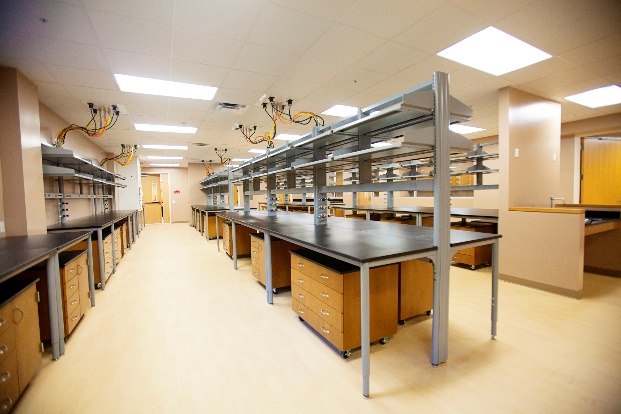
- The UF Brain and Spinal Cord Injury Research Program, established last year, has formed three working groups: Traumatic Brain Injury Group, Spinal Cord Injury Group and Ischemic Brain Injury Group. They began working together to increase research publications and program-project grant funding, with close to $500,000 of funding from the MBI.
- The Neurodegenerative Diseases Research Program has launched $1 million in RFAs for program-project grant preparation, postdoctoral fellowship supplementation and new technology development.

- The Age-related Memory Loss Research Program, supported by an endowment from the McKnight Brain Research Foundation, has established the Epigenomics Core, with additional fund from the MBRF. The Core will include bioinformatics capabilities and provide services to the four McKnight Brain Institutes — located at the University of Florida, the University of Alabama, the University of Arizona and the University of Miami — which have been collaborating through the annual interinstitutional meetings.
- The Drug Addiction Research Program continued to support studies on Effects of Secondhand Smoke: Cigarettes and Marijuana, preclinical neuroimaging, Restricted Repetitive Behavior in Autism, Treatment Outcomes of Physicians with Addiction, Low to Moderate Dose Alcohol Effects and Age on Driving, Deep Brain Stimulation for Smoking Cessation, Food Addiction in Obesity, and more. Mark Gold, M.D., chair of the Department of Psychiatry, received an award from the China Academy of Sciences in the Distinguished International Scientist category for his accomplishments.
- The MBI committed $363,000 in matching dollars to draw donations toward several fellowships and grad student and residency support.
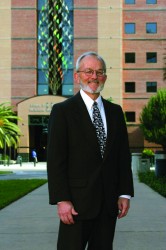
- With a gift from the MBRF, the MBI hosted the first William G. Luttge Lectureship in Neuroscience in March 2013, commemorating the founding director of the MBI who passed away nearly two years ago. Paul Gold, Ph.D., a distinguished professor of biology at Syracuse University, was the inaugural speaker, indulging us with his lecture Making Memories Metabolic – and Making Metabolic Memories.
- The MBI accomplished enrichment of the research environment through providing shared equipment grants, eliminating the duplication of the histopathology core and funding several faculty startup packages.
UF Health Shands Hospital (Shands Teaching Hospital and Clinics Inc.)
CEO: Timothy M. Goldfarb, M.H.A.
Whether we measure ourselves against teaching, research or patient care-related accomplishments, our health center experienced a record-setting 2013. For those of us at UF Health Shands, our year was both exhilarating and exhausting. The team worked very hard and accomplished so much. There were many highlights. As Dean Good noted, we achieved four-star status as measured by the University HealthSystem Consortium. We were awarded Magnet Status for the third consecutive time — thank you, Irene Alexaitis, the entire nursing team and their COM faculty colleagues! Our three-time Magnet designation is rare and reflects our commitment to patient care and teamwork.
The numbers illustrate the effort: more admissions, adult emergency visits, children’s emergency visits, operations in both the inpatient and outpatient settings. We did all of this in a way that was safe for our patients. Whether one measures complications or mortality rate, we did better than ever before. Our accomplishments have been recognized by the public and fellow professionals. More are choosing to come to us for their care. Our share of the hospital market place as measured by admissions has consistently increased, as have the number of patients transferred to our care from physicians and hospitals around the region. When we survey our patients and families, they tell us that our care is continually improving and they overwhelmingly recommend that others come to us for their care.
Shands invested the income generated by a successful year in new and upgraded facilities and technology. Our new Emergency Center on 39th Avenue opened to large volumes and satisfied customers. We just finished the newly renovated UF Health Congenital Heart Center pediatric cardiac intensive care unit. It was a top to bottom renovation that will serve our young patients and our staff very well. We expanded and renovated our Burn Unit. While the construction was proceeding, the patient care team relocated to the second floor in the north hospital and continued to deliver outstanding care. We have begun the renovation of the exterior of the UF Health Shands Children’s Hospital, followed soon by the hospital entrance and lobby. Along with this project, we relocated Volunteer Services. In each case, we have focused on creating the best environment for our patients and families while providing an outstanding place for our staff and faculty to work. We also invested in technology to provide our team the most contemporary systems and equipment. Kari Cassel and the IT staff followed last year’s successful Epic clinical system installation with multiple software upgrades and improvements (and another installation when it came to the faculty and hospital patient accounting systems). We now have a fully integrated patient IT network.
We continue to develop formal arrangements with fellow hospitals and professional colleagues around the region. Dr. Friedman and his team now provide a full range of neurosurgical services to our partners at Orlando Health. Dr. Vieweg and his urological group will soon do the same. Drs. Hromas, Okunieff and Behrns have partnered with Dr. Mark Roh from Orlando Health and created the UF Health Cancer Center—Orlando Health. This joint venture will provide the largest integrated cancer program in our state and one of the largest in our country. We hope to build on this accomplishment with better coordinated patient care and expanded research and educational opportunities. We were successful in gaining an ownership in Munroe Regional Medical Center in Ocala — an important step in maintaining and potentially expanding our service to the Marion County community. Over the next year we will work with Munroe leadership and their medical staff to identify clinical programs that will benefit all concerned.
In summary, we “hit on all cylinders.”
UF Health Jacksonville
CEO: Russell E. Armistead, M.B.A.
The Jacksonville campus is proud of its many accomplishments in 2013. We reached new milestones, made headlines and embarked on projects that will change our organization for the better.
UF Health Rebranding: We quickly and successfully transitioned to UF Health, which better tells our story as the premier academic health center in the Southeast, in part because research showed consumers feel very positively about our UF connection. The experience has had a positive effect not only in providing publicity, but also by encouraging closer collaboration between the UF and the hospital components of our organization, while reinforcing who we are and what we do.
Local Service Expansion & Growth: The building of our Northside facility is well underway. We broke ground Aug. 14 and anticipate a grand opening in early 2015. This portion of the project will serve as a medical office complex, housing multiple services and physicians in a state-of-the-art 210,000-square-foot, six-story building. We are also in the approval process to build a 92-bed hospital on this site. We received approval from the state for a Certificate of Need for the hospital, but that approval is currently being contested.
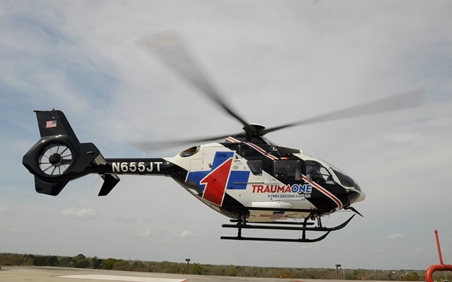 Our TraumaOne program reached a new milestone when we added a third helicopter to our fleet. We also adopted a new philosophy on placement of those helicopters. They are now out in the community, based at Flagler Hospital in St. Johns County to the south, in Yulee to the north and in Lake City to the west.
Our TraumaOne program reached a new milestone when we added a third helicopter to our fleet. We also adopted a new philosophy on placement of those helicopters. They are now out in the community, based at Flagler Hospital in St. Johns County to the south, in Yulee to the north and in Lake City to the west.
We have continued to expand our reach throughout the Jacksonville area. The department of oral and maxillofacial surgery opened a new practice, UF Health Aesthetic and Head & Neck Surgery – Southside. Our New Berlin clinic now offers pediatric services as well as family medicine for adults. We also expanded several of our service lines to a new facility in the beaches area. We reconfigured our Total Care Clinic to be better integrated with our existing hospital clinics to provide care in a Medical Home model.
Community Recognition and Support: Community leaders and editorial writers rallied to support us both in the Northside endeavor, and in our request for more funding from the city to support the large uninsured population we serve. One editorial headline read, “UF Health Jacksonville is one of city’s biggest unknown assets.” What began as two City Council members’ suggestion to do away with our $23.8 million funding from the city of Jacksonville resulted in a $2.5 million increase. Though it still doesn’t begin to cover the deficit, it was the first increase in the city’s contribution in more than a decade.
That’s just the beginning of the support we have received. We will be the “TPC Charity of the Day” for the Saturday of THE PLAYERS Championship tournament, which identifies us as a significant not-for-profit community organization in Jacksonville. Nine nurses were recognized as 2013 Great 100 Nurses of Northeast Florida. The nonprofit organization recognizes the finest in nursing while raising money for scholarships and community appreciation for the profession. Seven members of our faculty and staff were chosen for the Jacksonville Business Journal’s Health Care Heroes Awards. The recognition is a testament to our dedication to the advancement of medicine and the provision of quality patient care with safety and effectiveness. Our department of pediatrics received the Florida Governor’s Savings Award from Gov. Rick Scott for finding cost savings at the Jacksonville-based Northeastern Early Steps Program. The Governor’s Savings Award recognizes state employees and private-sector affiliates who identify cost savings for state programs while maintaining or increasing their effectiveness.
Rankings: We continued our four-star ranking for overall composite performance on the UHC Quality and Accountability Scorecard. U.S. News & World Report recognized us as one of the best hospitals in North Florida in its 2013-14 Best Hospitals rankings. We were listed as high-performing in 11 specialties, including cancer; cardiology and heart surgery; diabetes and endocrinology; ear, nose and throat; gastroenterology and GI surgery; geriatrics; gynecology; nephrology; neurology and neurosurgery; pulmonology; and urology. Florida Blue named UF Health Jacksonville a Blue Distinction Center in the areas of knee and hip replacement. The Blue Distinction Centers for Specialty Care® program is a national designation awarded by Blue Cross and Blue Shield companies to medical facilities that have demonstrated expertise in delivering quality specialty care. The American College of Cardiology Foundation awarded us the prestigious Platinum Performance Achievement Award. We’re one of just 164 hospitals nationwide — and the only one in Northeast Florida — to receive the award. The platinum award is given to organizations that demonstrate the highest standards of care and treatment. UF Health Jacksonville was singled out for its success in treating the most serious heart attack patients for two consecutive years. We received an A rating from the Leapfrog Group, a national nonprofit that focuses on reducing preventable medical errors. This was an improvement of two letter grades over our previous rating. Grades are assigned based on 26 measures of publicly reported safety data. We received a Gold Award from DMS for our outcomes related to organ donations. We received the highest Value-Based Purchasing scores among all Jacksonville hospitals.
Clinical Quality & Patient Safety: We began Patient Safety Executive Walk-Rounds to improve patient safety and staff communication. We trained more than 400 residents and faculty in our Simulation Lab. We have also trained more than 10,000 members of our community in hands-only CPR and plan to train many more. We are working to improve the quality of our palliative care services. We received an Integrated Medication Management Services Award for our role in providing collaborative drug therapy management to indigent patients in our community clinics. Our clinical pharmacists simplify patient medication access, provide routine patient counseling and explain drug/disease education goals to patients.
As we roll up our sleeves for 2014, we have a number of goals to pursue. We would like to get final approval from the state for our Northside hospital and move forward on that project. Our nursing staff is gearing up for Magnet re-designation. And, as always, we will continue working diligently to improve our patient experience.
2014 is clearly upon us in full force, and things seem busier than ever. Among other things, since the 5-year Forward Together Strategic Plan will come to an end in May of 2015, we will be creating our second 5-year plan during 2014. This process will involve the college deans, center and institute directors, hospital leadership and the faculty and staff in each of the colleges and hospitals. We have created significant momentum in all of our missions and are well on our way to achieving our vision of making this momentum unstoppable.
Forward Together,
David S. Guzick, M.D., Ph.D. Senior Vice President, Health Affairs President, UF Health
About the author
